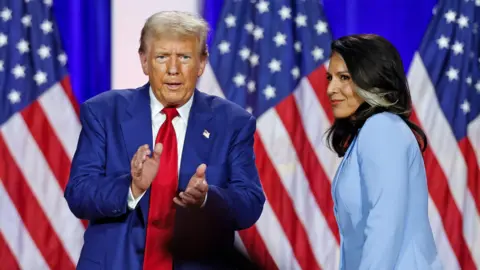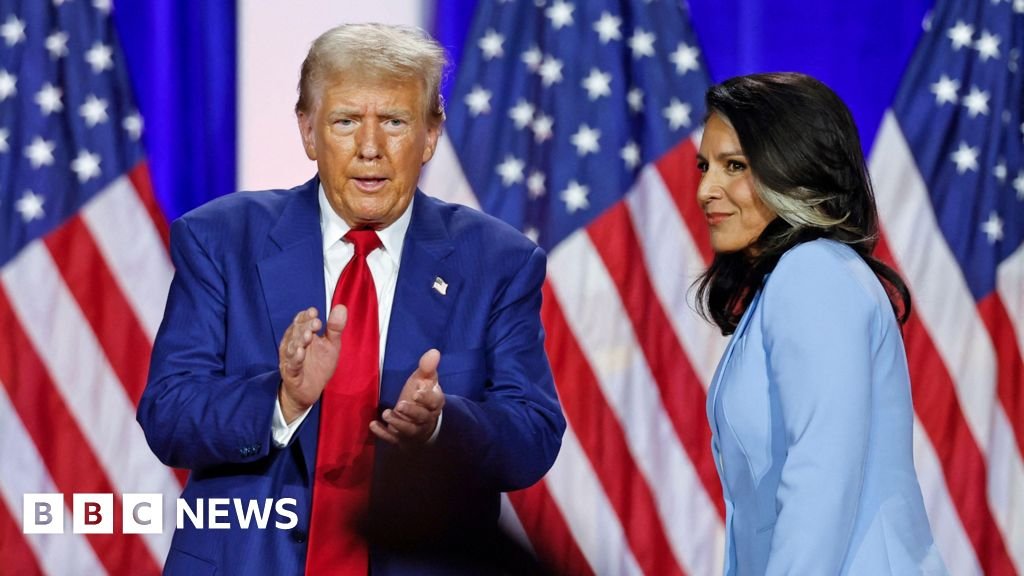 Getty Images
Getty ImagesIf personnel really does amount to policy, then we’ve learned a lot this week about how Donald Trump intends to govern in his second term.
More than a dozen major appointments, some of which will require Senate approval, offer a clearer picture of the team entrusted to drive his agenda as he returns to the White House.
On the outside they appear united by one thing – loyalty to the top man.
But beneath the surface, there are competing agendas.
Here are four factions that reveal both Trump’s ambition and potential tricky tests ahead for his leadership.
Deep State disruptors
By Mike Wendling, BBC News, Chicago
Who: Matt Gaetz, Tulsi Gabbard, RFK Jr
Their agenda: This trio have been among the most vocal politicians actively opposing US policies, particularly under President Biden. Choosing Gaetz as his attorney general nominee is possibly Trump’s most controversial pick.
Gaetz has represented Florida’s first congressional district since 2017. A graduate of William and Mary Law School, he led the removal of California congressman Kevin McCarthy as the sitting Speaker of the House in October 2023.
He has come under investigation by a House ethics committee for allegedly paying for sex with an underage girl, using illegal drugs and misusing campaign funds. He denies wrongdoing and no criminal charges have been filed.
Tulsi Gabbard, picked to be Trump’s director of national intelligence, is a military veteran who served with a medical unit in Iraq. She is a former Democratic congresswoman from Hawaii who switched parties to support Trump.
Gabbard has routinely opposed American foreign policy, blaming Nato for Russia’s invasion of Ukraine and meeting Syrian President Bashar al-Assad – then casting doubt on US intelligence assessments blaming Assad for using chemical weapons.
Robert F Kennedy Jr, Trump’s nominee to oversee health, is a longtime lawyer and environmentalist. He also spread fringe theories – about vaccines and the effects of 5G phone signals.
What this tells us: Like Trump, Gaetz, Gabbard and Kennedy are aggressive challengers of the status quo. All three frequently tip over into conspiracy.
They may be among the most determined supporters of Trump’s plan to dismantle the bureaucratic “deep state”. The president-elect has picked particular fights in each of the areas they would oversee – law enforcement, intelligence and health.
But bomb-throwers can also make unruly subordinates. Kennedy wants stricter regulation across food and farming industries, which may collide with Trump’s government-slashing agenda.
Gaetz’s views on some issues – he favours legalisation of marijuana – are outside the Republican mainstream.
And Gabbard, a fierce critic of American power, will be working for a president who is not afraid to use it – for instance, against Iran.
Border hardliners
By Bernd Debusmann, BBC News, Washington
Who: Tom Homan, Stephen Miller and Kristi Noem
Their agenda: The three hardliners tasked with carrying out Trump’s border and immigration policies have vowed to strengthen security and clamp down on undocumented immigrants crossing the US-Mexico border.
Domestically, they – and the wider incoming Trump administration – have called for a drastic uptick in deportations, beginning with those considered national security or public safety threats, and a return to workplace “enforcement operations” that were paused by the Biden administration.
What it tells us: Aside from the economy, polls repeatedly suggested that immigration and the border with Mexico were primary concerns for many voters.
The possibility of increased deportations and workplace raids, however, could put Trump on a collision course with Democratic-leaning states and jurisdictions that may decide to push back or not co-operate. Some Republican states – whose economies rely, in part, on immigrant labour – may also object.
Tech libertarians
By Natalie Sherman, BBC business reporter, New York
Who: Elon Musk, Vivek Ramaswamy
Their agenda: Trump has named the world’s richest person, Elon Musk, to lead a cost-cutting effort dubbed the “Department of Government Efficiency”.
He will share the role with 39-year-old investor-turned-politician Vivek Ramaswamy, who became an ardent Trump backer after bowing out as a candidate in the Republican primary.
The two men are among the loudest and flashiest tech bros, a group that swung towards Trump this year, seeking a champion to disavow “woke” political correctness and embrace a libertarian vision of small government, low taxes and light regulation.
Musk has floated a possible $2tn in spending cuts, vowing to send “shockwaves” through the government.
Ramaswamy, who has backed eliminating the tax-collecting agency, the IRS, and the Department of Education, among others, wrote after the announcement: “Shut it down.”
What it tells us: The appointments are an acknowledgment of the help Trump got on the campaign trail from Ramaswamy and Musk, the latter of whom personally ploughed more than $100m into the campaign.
But time will tell what power this faction goes on to have.
Despite its name, the department is not an official agency. The commission will stand outside the government to advise on spending, which is partly controlled by Congress.
Trump, who ran up budget deficits during his first term, has shown little commitment to cutting spending.
He has promised to leave Social Security and Medicare – two of the biggest areas of government spending – untouched, which could make cost-cutting difficult.
RFK Jr’s pledge to increase regulation of food additives and ultra-processed foods could also clash with Musk and Ramaswamy’s mandate to cut red tape.
China hawks
By Tom Bateman, BBC state department correspondent
Who: Marco Rubio, Mike Waltz, John Ratcliffe.
Their agenda: These men will run Trump’s “America First” foreign policy. They are all hawks on China.
Rubio, nominee for secretary of state, is among Beijing’s harshest critics, having argued for travel bans on some Chinese officials and for the closure of Hong Kong’s US trade offices.
The three are likely to push through Trump’s pledge for much higher tariffs on Chinese imports. They see Beijing as the top economic and security threat to the US. Waltz – picked for national security adviser – has said the US is in a “Cold War” with the ruling communist party.
Ratcliffe, Trump’s nominee for CIA director who served as an intelligence chief in his first term, has likened countering China’s rise to the defeat of fascism or bringing down the Iron Curtain.
What it tells us: While Trump often signals his own hawkish economic views on China, he has also vacillated – which could spark tensions with his top foreign policy team.
In his first term, Trump triggered a trade war with Beijing (attempts to de-escalate this failed amid the pandemic) and relations slumped further when he labelled Covid the “Chinese Virus”.
But he also heaped praise on President Xi Jinping as a “brilliant” leader ruling with an “iron fist”.
This unpredictability could make managing America’s most consequential strategic relationship even harder. Rubio might also clash with Gabbard, Trump’s pick for director of intelligence, who previously criticised him on foreign policy, saying he “represents the neocon, warmongering establishment”.












